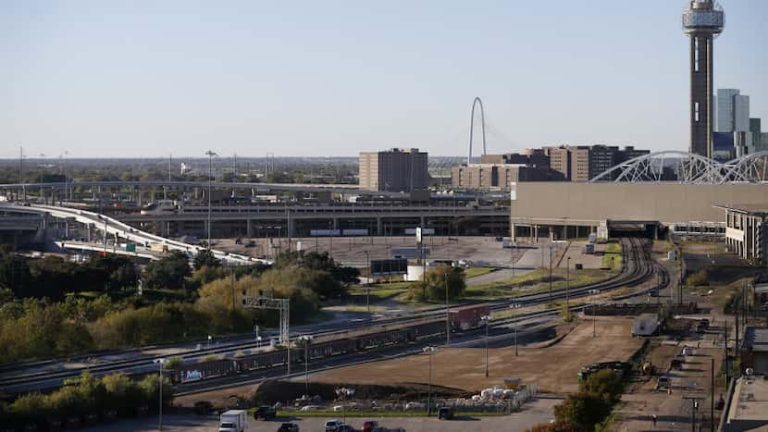A proposed high-speed rail line in North Texas could bypass downtown Dallas and head to Fort Worth after city leaders questioned how it would affect a planned new $3 billion convention center and a $5 billion redevelopment project nearby.
The Regional Transportation Council, made up of elected and appointed officials who oversee transportation policy and planning in North Texas, is scheduled to discuss the potential new route at a meeting Thursday.
It was sent to the 45-member Transport Council on June 28th. Dallas Morning News It shows the railroad tracks passing behind the redevelopment project and crossing Interstate 35E toward Arlington and Fort Worth.
A proposed route presented to Dallas City Council members in March would have seen an elevated train run between the new convention center and redevelopment projects. The City Council voted in June to formally oppose a new at-grade high-speed rail route through downtown.
The rail line, which would follow the I-30 corridor with stops in Dallas, Arlington and Fort Worth, has been touted as a way to ease growing freeway congestion in a metropolitan area of 8 million people that is expected to grow to more than 11 million by 2045.
In a June 28 email, Michael Morris, transportation director for the North Central Texas Council of Governments, said staff “intends to present an improved alignment proposal” by Thursday’s meeting. NCTCOG is working with local governments on projects throughout the region. The subject of the email was “High-speed rail initiative near downtown in response to City of Dallas resolution.”
Morris did not respond to a request for comment about the proposed new route. In March, he told city council members the project could cost $6 billion, but said that estimate would be revised once an environmental study is completed next year.
Regional transportation officials said the line from Dallas to Fort Worth would carry people from one end to the other in under 30 minutes at speeds of up to 100 miles per hour.
Another commuter rail line, the Trinity Railroad Express, already runs between Dallas and Fort Worth. It takes at least an hour to ride the TRE from Eddie Bernice Johnson Union Station in downtown Dallas to the T&P station in downtown Fort Worth.
“We are very concerned about the safety of our city,” said three Dallas City Council members who serve on the Regional Transportation Council. news They said they don’t know enough about the new rail line proposal to say whether they would support it.
City Councilman Omar Narvaez is concerned about how routes that avoid downtown would affect other ways to travel through the area, noting that the downtown plan includes pedestrian walkways such as skybridges connecting to the convention center and Eddie Bernice Johnson Union Station.
“We always talk about connectivity being the goal, but whether this gets us there remains to be seen,” he said.
City Councilman Chad West supported the idea of high-speed rail connecting Dallas and Fort Worth, but said he wanted to hear more details about the new proposal.
The proposed high-speed rail station, to be built near Cadiz Street in Dallas’ Cedars neighborhood, is expected to be seven stories tall. Above ground. This is the only option approved by the federal government.
The site would also be the terminus of a 240-mile high-speed rail line connecting Dallas and Houston. Amtrak is involved in the planning of the project, and the Dallas City Council has no objections.
But City Council Member Kara Mendelson was skeptical that both high-speed rail lines, including Dallas, would come to fruition.
“I’m not going to agree to a proposed Dallas to Fort Worth line until I’ve seen the staff’s technical analysis and am confident that a rail line from Dallas to Houston will actually be built,” she said.
The Dallas to Houston line is estimated to provide travel time of about 90 minutes between the two cities at speeds of up to 200 mph. Andy Byford, Amtrak’s senior vice president of high-speed rail development programs, told council members at the March 6 meeting that the line is estimated to cost more than $30 billion to build.
Officials hope the two bullet train projects will be linked.
Concerns about the Dallas-Fort Worth project led the Dallas City Council to request an economic study in March. Council members said in June they would reconsider their stance on the project based on the results of the study. City officials have said the study won’t begin until October at the earliest and will take at least three months to complete.
“We’re excited about this opportunity,” said a representative for Hunt Realty Investments, one of the largest property owners in downtown Dallas and the group that owns more than 20 acres of land surrounding the Hyatt Regency hotel. news In March, they said they believed the elevated railway would prevent further new development on their land and around the convention center.
Despite calls from Dallas officials to put the brakes on the project, other local leaders are pushing for the high-speed rail plan to continue.
Dallas County Judge Clay Lewis Jenkins, who chairs the Regional Transportation Council, Arlington Mayor Jim Ross and Fort Worth Mayor Mattie Parker are among officials who have publicly supported the project.
“High-speed rail is an essential part of our transportation future, and that includes Tarrant County,” Gov. Parker said in a statement last month. She said an economic feasibility study on the impacts of high-speed rail should be a “local decision.”

